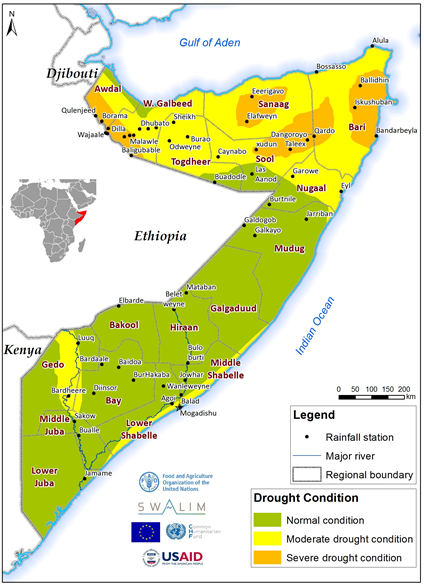SWALIM Supports Natural Resource Management Activities in Somalia
The rapidly increasing human population in Somalia, coupled with protracted civil strife, continues to exert heavy pressure on the land and environment, resulting in a rapid depletion of the country’s natural resources. The current situation is unsustainable, in that resources are being extracted more quickly than they can regenerate, leading to the gradual loss of these important biological assets. The principle threats to biodiversity in Somalia include commercial land use practices, like deforestation for timber and charcoal production, soil depletion through over-harvesting, and changes in climate, which have led to decreased rainfall.
Over the years, FAO SWALIM has been a champion in NRM-related activities in Somalia. FAO SWALIM has the infrastructure, trained experts, hardware and software to collect and handle natural resource data. Using Remote Sensing and GIS techniques for natural resource inventory and mapping, coupled with scientifically authenticated field observations, SWALIM’s NRM-related activities have been cutting edge. The overall strategy has been to strengthen Somali technical staff by offering training in scientific approaches to NRM work.
In this context, and due to the availability of technical capacity under the FAO Resilience Programme 2013-2015, FAO SWALIM was mandated to support Natural Resource Management (NRM) activities in Somalia. The aim, under this programme, is to establish a one-stop-shop for data and information by developing a modern and comprehensive database for natural resource planning. This will improve the management of existing natural resources by facilitating the identification and formulation of appropriate development policies which support sustainable and equitable development. Better information will permit optimum utilization, co-ordination and management of natural resources and the environment, as well as strengthening the cooperation between local communities and other stakeholders.
FAO SWALIM activities under the programme were focused on four pilot districts: Doolow, Burco, Owdweyne and Iskushuban. In each of the four districts, the aim was to establish a community tree nursery and generate data and information on soil nutrient levels, land cover, land use, and Safe Access to Fuel and Energy (SAFE) in the humanitarian context. It is hoped that the tree nurseries will provide seedlings for woodlot planting and also provide fruit trees for the agro-pastoralists. Community natural resource management plans would also be produced under the programme.
The programme activities were concluded in Doolow (with databases and a draft report ready), while work is on-going in the other localities. Nevertheless, in Owdweyne and Burco, the NRM inventories were completed and the results were incorporated in the Diagnostic Land Resources Report of Somaliland, which was produced by FAO SWALIM and put into the public domain for use in natural resources planning and management.
Under the SAFE initiative, a mission composed of technical staff from FAO Somalia office, FAO Headquarters in Rome and the Regional Forestry & Climate Change Office in Addis-Ababa visited Hargeisa and Doolow to conduct focus group discussions with the communities on SAFE-related activities. Following the baseline field surveys discussions, a first draft of a SAFE strategy for Somalia was developed. The strategy includes details on conflict resolution, gender-based violence and health issues related to access to fuel and energy. Organisations involved in SAFE initiatives in the targeted communities were also characterized and mapped.
Asics footwear | Women's Nike Air Jordan 1 trainers - Latest Releases , Ijmedph


